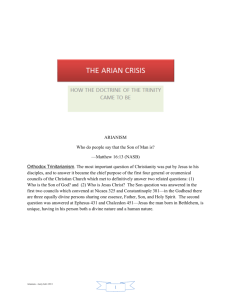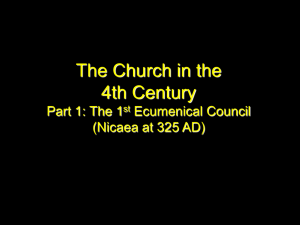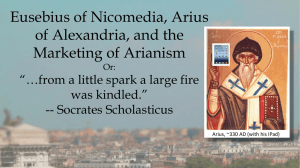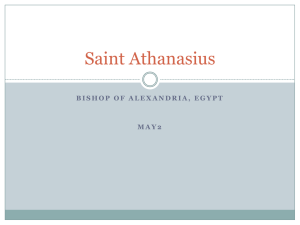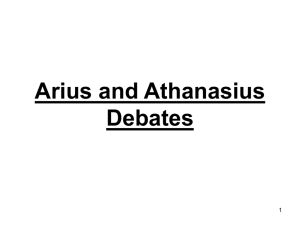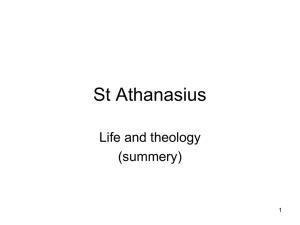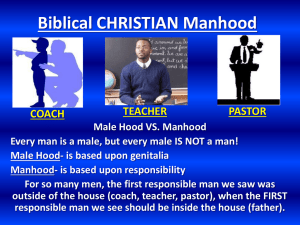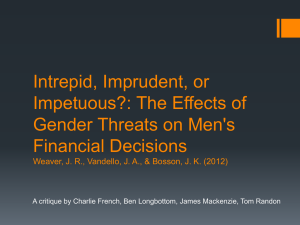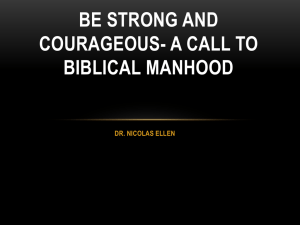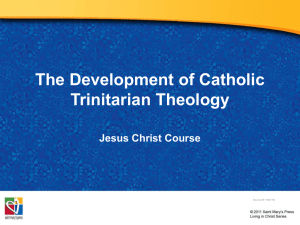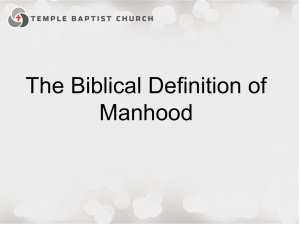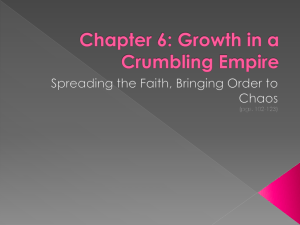PowerPoint
advertisement
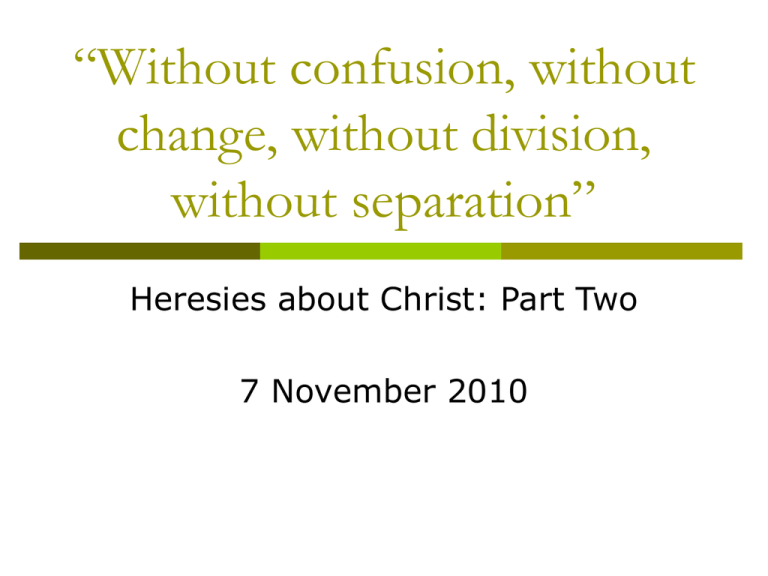
“Without confusion, without change, without division, without separation” Heresies about Christ: Part Two 7 November 2010 Some Christological whimsy from our brethren in the Church of Rome Some Christological whimsy from our brethren in the Church of Rome Back to Richard Hooker “There are but four things which concur to make complete the whole state of our Lord Jesus Christ: his Deity, his manhood, the conjunction of both, and the distinction of the one from the other being joined in one.” – Laws of Ecclesiastical Polity 5.54.10 Four ways of going wrong “his Deity” “his manhood” “the conjunction of both” “the distinction of the one from the other” Four ways of going wrong “his Deity” Arianism – Council of Nicaea, 325 “his manhood” “the conjunction of both” “the distinction of the one from the other” Four ways of going wrong “his Deity” Arianism – Council of Nicaea, 325 “his manhood” Apollinarianism – Council of Constantinople, 381 “the conjunction of both” “the distinction of the one from the other” Four ways of going wrong “his Deity” Arianism – Council of Nicaea, 325 “his manhood” Apollinarianism – Council of Constantinople, 381 “the conjunction of both” Nestorianism – Council of Ephesus, 431 “the distinction of the one from the other” Four ways of going wrong “his Deity” Arianism – Council of Nicaea, 325 “his manhood” Apollinarianism – Council of Constantinople, 381 “the conjunction of both” Nestorianism – Council of Ephesus, 431 “the distinction of the one from the other” Eutychianism – Council of Chalcedon, 451 Arianism Arius of Alexandria (c. 270-336) “There was a time when he was not.” The Son is a created being. The Son and the Father do not have the same essence (ousia). What was Arianism all about? One view: It was an intrusion of Greek philosophy into Christian thinking. Arius makes a sharp separation between God and creatures. As part of this, he emphasizes that God is completely beyond our understanding – apophatic theology. Another view: Arius was trying to preserve Christianity from making itself culturally irrelevant. What was Arianism all about? A third view: Arius was defending strict monotheism. Rowan Williams: “Those who have insisted that the Arian controversy is essentially about hermeneutics are right. . . . It is not primarily a disagreement about the god of the philosophers versus the God of Abraham, Isaac and Jacob (this is a tension as sharply felt in Catholic as in heterodox writers).” The futility of proof-texting Proverbs 8:22 – “The Lord created me at the beginning of his work, the first of his acts of old.” Psalm 45:7-8 – “You love righteousness and hate iniquity. Therefore God, your God, has anointed you with the oil of gladness above your fellows.” Romans 8:29 – “For those whom he foreknew he also predestined to be conformed to the image of his Son, in order that he might be the first-born among many brethren.” Enter Athanasius Athanasius of Alexandria (c. 296-373) Athanasius argued that by going wrong about the person of Christ, Arius also went wrong about the work of Christ. He also argued that Arius made Christian practice incoherent. Time for a Council Constantine summoned all the bishops of the Church to Nicaea for a council in 325. 250 bishops (of about 1800) attended. In the end, only two bishops sided with Arius. The Council authorized a Creed that would explicitly repudiate the ideas of Arius. But what should it say? Homoiousios or homoousios? Four ways of going wrong “his Deity” Arianism – Council of Nicaea, 325 “his manhood” Apollinarianism – Council of Constantinople, 381 “the conjunction of both” “the distinction of the one from the other” Apollinarianism Apollinarius (c. 310-c. 390) was a leading anti-Arian, friend of Saint Athanasius, and Bishop of Laodicea. He denied that there was a human mind or soul in Christ. You can see how this is an anti-Arian move. Does this sound Apollinarian? “The Word assumed a body capable of death, in order that it, through belonging to the Word Who is above all, might become a sufficient exchange for all. . . . It was by surrendering to death the body which He had taken, as an offering and sacrifice free from every stain, that He forthwith abolished death for His human brethren. . . . For naturally, since the Word of God was above all, when He offered His own temple and bodily instrument as a substitute for the life of all, He fulfilled in death all that was required. . . . For the solidarity of mankind is such that, by virtue of the Word's indwelling in a single human body, the corruption which goes with death has lost its power over all.” What’s wrong with Apollinarianism? Gregory of Nazianzus: “That which was not assumed is not healed, but that which is united to God is saved.” The Council of Constantinople (381) condemned Apollinarianism, ratified the anti-Arian doctrine of the Council of Nicaea, and affirmed the divinity of the Holy Spirit against the Pneumatomachoi. Next week We’ll finish Christological heresies, and then move on to . . . Heresies about the Church: “No, your bishop does not have cooties.”
